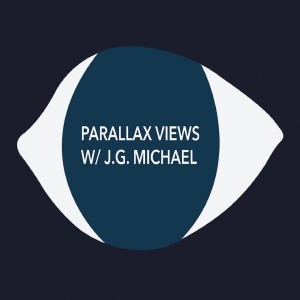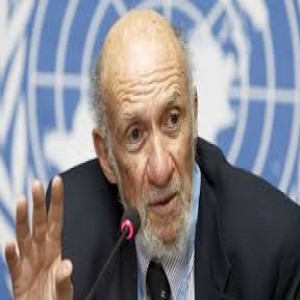
Parallax Views w/ J.G. Michael
Society & Culture

Rising Authoritarianism, the Neoliberal World Order, and the New Cold War w/ Richard Falk
 2020-09-02
2020-09-02
On this edition of Parallax Views, Richard A. Falk is a professor emeritus of International Law at Princeton University and served from 2008-2014 as the UN Special Rapporteur on the Situation of Human Rights in the Palestinian Territories Occupied since 1967. Prof. Falk has dedicated a lifetime to the cause of human rights and was one of the key conceptualizers of a World Order that, in promoting peace and cooperation over war and politics, sought to counteract the realist school of foreign policy expressed former U.S. Secretary of State Henry Kissinger as well as former U.S. President George H.W. Bush's idea of a "New World Order" in the post-Cold War era that would be exemplified by American primacy and U.S. full spectrum dominance over the rest of the world. At 89 year old, Prof. Falk continues to tirelessly speak to matters of global import seeking justice, peace, cooperation, and the pursuit of human right for citizens around the world.
After reading his recent Counterpunch op-ed "Trumpism, Where Does It Go From Here?", I reached out to Prof. Falk in the hopes that he could share his knowledge of expertise with Parallax Views listeners. He agreed to an interview and spoke with me for an hour on a number of topics including:
- How did we get to this moment that has seen the rise of authoritarianism and autocratic demagogues in the U.S. vis-à-vis Trumpism and around the globe as exemplified figures like Rodrigo Duterte in the Phillipines, Viktor Orbán in Hungary, and Jair Bolsonaro in Brazil?
- Discontent with elites and the inequities created by neoliberal globalization; the pluralism of elites and the divide over Donald Trump's Presidency amongst the elite elements of society; the rural vs. urban divide; the problem with and peculiarities of the Electoral College system in the United States; solution to the issues with face us in regard to U.S. elections due to the way the American electoral system is set up
- The meaning of the concept of the "World Order" and how it differs from the right-wing, paranoid vision of a conspiratorial "New World Order" led by a globalist cabal. How Dr. Falk's belief in "World Order" differs from the both George H.W. Bush's concept of the "New World Order" in the aftermath of the Soviet Union's collapse and the feverish apocalyptic nightmares of the John Bircher Society-esque paranoid-style that pervades the American right today
- The potential for the Digital Age to flatten the countryside vs. city distinction and the new inequities that could arise from the Digital Age; society is changing but not at the pace of the rising global changes facing the world like rapidly increasing economic inequality and climate change
- The New Cold War with China and Washington, D.C.'s hawkish bi-partisan consensus on it; China as a different kind of adversary to the U.S. than the Soviet Union; Graham Ellison's Thucydides's Trap and applying it to understanding present U.S.-China relations
- Are we living in a multipolar world of multiple superpower as opposed to the unipolar world of American hegemonic dominance as envisioned by many after the end of the Cold War?; U.S.'s "hard power" through military spending and might vs. China's "soft power" approach in the current geopolitical confrontation
- Assessing the Obama Presidency in regards to geopolitics and foreign policy; the early Obama Presidency's hopes of manuevering past the Washington D.C. foreign policy "Blob" and why he gave way to the bi-partisan consensus on American foreign policy
- the risk factors of a Biden Presidency and a Trump Presidency; what Biden's foreign and American security policy would likely look like; Biden's domestic policy and how it will likely be referential to the "Wall Street or Goldman Sachs View of the World"; the "Third Way" neoliberalism of Clinton Democrats and what effect movements like Black Lives Matter (BLM), arising in response to the police killing of George Floyd, will have on a Biden White House and that wing of the Democratic Party
- The deep distrust that exists between both primary wings of the Democratic Party; much has been made of the progressive wing's distrust of Biden-style Clinton Democrat moderates/centrists, but the same hold true on the opposite end: moderate Democrats, specifically those with of material interests that would be impacted by addressing structural inequalities, like socially liberal policies but fear that the Bernie Sanders and Alexandria Ocasio Cortez wing of the party are too radical; the variation that exists even within the moderate wing of the party on economic inequality issues and the "trick" that prevents Democrats from progressing in regards to social justice and economic inequity issues facing the U.S. today
- The risks of a second-term Trump Presidency in the White House; the cluster of primary and secondary concerns the U.S. would face in lieu of Trumps' potential second term in office; Saudi-Israel hegemony in the Middle East under Trump and its implications
- Demystifying the situation of Iran and its relationship to the U.S. since 9/11 and Bush's War on Terror Prof. Falk gives a rundown of recent Iranian history and understanding the history of that region within a post-colonial lens since the Iranian revolution; the thought of Ayatollah Khomeini; Obama's normalization-seeking approach to U.S.-Iran relations vs. Trump's aggressive approach to U.S.-Iran relations
- The Israel/Palestine conflict; Prof. Falk's thoughts on the project as a former UN Special Rapporteur on the Situation of Human Rights in the Palestinian Territories Occupied since 1967; shifting popular opinion on the Israel/Palestine conflict; Prof. Falk's hope and optimism for Palestine going forward and his belief that the conflict will be solved via popular resistance and global solidarity rather than UN actions
- Prof. Falk provides possible reasons for hope going into the 2020 election; realizing the dangers of militarism and how recognizing it can allow for more effective forms of cooperative governance globally in the future
This Episode Brought to You By:
The War State:
The Cold War Origins of the Military-Industrial Complex and the Power Elite, 1945-1963
by
Michael Swanson
of
The Wall Street Window
More Episodes
Create your
podcast in
minutes
- Full-featured podcast site
- Unlimited storage and bandwidth
- Comprehensive podcast stats
- Distribute to Apple Podcasts, Spotify, and more
- Make money with your podcast
It is Free
- Privacy Policy
- Cookie Policy
- Terms of Use
- Consent Preferences
- Copyright © 2015-2024 Podbean.com





